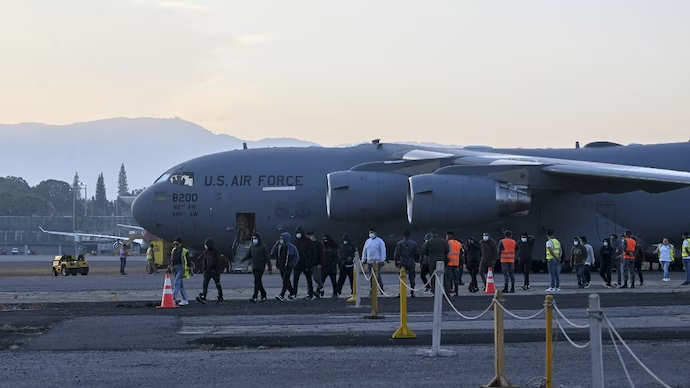On Wednesday, February 5, 2025, a US C-17 military aircraft, initially scheduled to land in the morning, is expected to arrive at Shri Guru Ramdas Ji International Airport in Amritsar carrying illegal Indian migrants. These individuals, who have been deported back to India from the United States, are mostly from Punjab and neighboring regions. The development follows a broader crackdown on illegal immigration by the US government after President Donald Trump’s recent administration policies. The situation has sparked reactions from both governments, as well as from officials and ministers in Punjab, shedding light on the growing concerns regarding illegal immigration.
In This Article:
US C-17 Globemaster aircraft – Background of the Deportation
The US C-17 Globemaster aircraft, which took off from San Antonio in Texas, is part of an ongoing effort by US law enforcement agencies to deport individuals who entered the country illegally or overstayed their visas. Reports indicate that many of these deported migrants entered the US via what is commonly referred to as “donkey routes,” illegal pathways used by individuals, often from Punjab, to reach the United States. These routes, which involve spending large sums of money, have become a concerning trend as more people fall victim to human trafficking and smuggling.
Following the assumption of office by President Donald Trump, there has been a significant intensification in the crackdown on illegal immigrants. Trump’s administration has prioritized tightening immigration laws, making it increasingly difficult for undocumented migrants to remain in the country. As a result, many individuals who initially entered the US on valid work permits later found themselves in an undocumented status when their visas expired, leading to their deportation.
Reactions from Punjab’s Government
The news of the deportation of illegal Indian immigrants has evoked strong responses from both the state and central governments in India. Kuldeep Singh Dhaliwal, Punjab’s Minister for NRI Affairs, expressed deep disappointment over the deportation, stating that many of the individuals returning had contributed significantly to the US economy. Dhaliwal questioned why these individuals, who had been in the US for years, were not granted permanent residency or other legal status.
The minister emphasized that many of the deported individuals had entered the US legally but had overstayed their visas due to various reasons, including the inability to renew them. In his statement, Dhaliwal urged Punjabis to avoid traveling abroad through illegal means and called for a shift in mindset. He stressed that young people should focus on acquiring skills and education to access legitimate job opportunities abroad.
Dhaliwal further mentioned that he plans to meet with India’s External Affairs Minister, S. Jaishankar, next week to discuss the concerns surrounding the situation and the interests of Punjabis living in the United States.
Role of the Punjab Police and Other Authorities
The Punjab government, particularly the state’s police force, is on high alert as the deported migrants prepare to return home. Punjab’s Director General of Police (DGP), Gaurav Yadav, confirmed that the state authorities are prepared to handle the arrival of the deportees. Special counters will be set up at Amritsar airport to facilitate the smooth reception of the individuals, ensuring they are accounted for and assisted as needed.
In light of the growing number of deportations, the state government is keen on ensuring that the process of handling these returnees is organized and dignified. At the same time, authorities are focused on preventing illegal migration in the future and maintaining vigilance against similar issues.
International Context and Implications
The deportation of Indian migrants by the United States comes at a time when global migration and immigration laws are under increasing scrutiny. Countries around the world are reassessing their immigration policies in response to rising migration numbers, especially following the pandemic. Many nations, including the US, have strengthened their immigration enforcement practices, creating hurdles for undocumented migrants and those living in the country on expired visas.
This situation has sparked protests across the US, with groups rallying against the government’s strict immigration policies. On February 4, 2025, high school students in Los Angeles participated in a protest called “A Day Without Immigrants,” in which they highlighted the contributions of immigrants to the US economy and society. Such demonstrations underscore the tension between immigrant communities and the enforcement of stricter immigration laws.
Looking Ahead: Addressing the Root Causes of Illegal Immigration
The rise in illegal immigration from India, particularly from Punjab, highlights the need for a broader conversation about the root causes driving individuals to take such dangerous routes to foreign countries. Issues such as lack of employment opportunities, economic instability, and the promise of a better life abroad have led many to take the risk of migrating illegally.
While the Indian government has called for more stringent checks to prevent illegal migration, the root causes of this trend need to be addressed as well. Investing in education, skill development, and better employment prospects within India can help curb the push for illegal migration, reducing the number of individuals falling prey to unscrupulous agents and illegal pathways.
Conclusion
The arrival of the US C-17 aircraft carrying deported Indian migrants serves as a stark reminder of the ongoing issue of illegal immigration and the challenges faced by countries in controlling their borders. While the reactions from both the Indian government and Punjab’s local authorities reflect the gravity of the situation, there is an urgent need to address the factors driving illegal immigration in the first place. As discussions continue on both sides, it remains clear that a long-term solution must focus on both enforcing immigration laws and improving conditions at home to prevent individuals from seeking unsafe and illegal routes to other countries.



